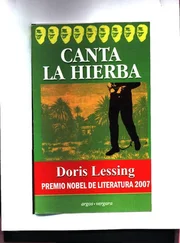Alice was evolving her soup. But she needed, and did not want to buy, an extra-large saucepan. Her mother had such a saucepan. Leaving her assistants chopping vegetables and soaking lentils, she took the Underground, and then walked until she found herself standing in front of the "For Sale" sign. She had forgotten her mother had moved. This made her impatient and angry; she was again angry with her mother. The new address was competently filed away in her mind. It brought with it a feeling of shame, of regret. Not a very nice area; it could just - Alice supposed - be called Hampstead, by someone charitable. Soon she was standing outside a four-storey block of flats, with a small dirty garden in front. Surely her mother was not living here? Yes, her name was on a scrap of paper inserted in a slot opposite number 8: Mellings. An entry phone. Alice was in the grip of an inexplicable panic, could not make herself ring it. But an old woman was standing next to her, putting a key in the door. "Excuse me," Alice improvised, "I'm looking for a Mrs. Forrester. Number two."
"You wouldn't find a Mrs. Forrester in number two, love. I'm number two. And I am Mrs. Wood."
"That's funny," said Alice, all bright and chattyr every granny's dream. "Do you know if there's a Mrs. Forrester in this building at all?"
"No, I am sure not, no Forresters here," and the old girl laughed at her joke. Alice laughed. Then, as Alice had prayed she would, she said, "I'm going to put the kettle on. Would you like a cup of tea?" Oh yes, wouldn't she; and in went Alice, pushing the shopping trolley, opening the door into number 2, and going into the little kitchen to help with the disposal of the shopping. Part of her mind was sternly chiding: What do you think you are doing, letting just anybody in? Why, I might be a mugger. Another screamed: My mother can't be living here, she can't. Still another was saying: I'm going to blow this place down, I am, it shouldn't be allowed.
Mrs. Wood's flat, and presumably Dorothy Mellings's flat, contained two not very large rooms, with a kitchen just big enough to take a little table, at which Mrs. Wood and Alice sat close to each other, side by side, staring at a dingy yellow wall, drinking tea and eating two biscuits each. Mrs. Wood was on the pension. Working-class. She had a son in Barnet who visited on Sundays. She did not like her daughter-in-law, God forgive her. She had a grandson, aged five.
Dorothy Mellings had no family to visit her at weekends; this thought brushed the surface of Alice's mind, but was rejected with a gust of emotion: if her mother had decided to live in a place like this, then she must have gone mad!
By the time Alice left, she knew to the last inch of cupboard space what her mother, three floors up, would have; and there certainly would not be room for an enormous aluminium saucepan.
Alice stayed a good hour or more, and left with promises to return. She went to the hardware shop and bought the necessary saucepan, thinking that after all there would be many more congresses and meetings at number 43, and if she had to move, the saucepan would go with her.
But she had received a blow; her heart whimpered and hurt her; she had no real home now. There was no place that knew her, could recognise her and take her in.
Suddenly a whole army of recollections invaded her.
Alice was standing in the middle of the pavement, in the rush hour, embracing an aluminium saucepan large enough to cook a small shrub, staring and apparently in a state of shock.
She was remembering her mother's parties. They had gone on all through her childhood and adolescence. After Alice had departed to university, seldom to return home, they had gone on still; she would hear about them from someone, probably Theresa. "One of your mother's parties, you know - it was marvellous." They always happened the same way. Her mother would remark, with a restless, harassed look, "It's time we had a party; oh no, I can't face it." Then she would start, asking this person and that, for a date a month ahead. Her reluctance towards the party vanished, and she began to shine with energy. She asked Cedric's political colleagues, all the people working in C. Mellings, Printers and Stationers, the innumerable people she knew, who always seemed to be floating in and out of the house anyway. She knew everyone in the street, and they were all invited. She asked a woman met at the grocer's with whom she got into conversation, the man who came to mend the roof, a new au pair from Finland (met on a bus) who must be lonely. By the day of the party, which started at midday, as many as a hundred people were jostling one another all over the house, and half of them were probably still there at midnight, being fed out of Dorothy's saucepan, the size of a hip bath. They were wonderful parties. Everyone said so. Alice said so. "Oh, good," she would cry, "are we going to have another party," and at once began fretting to help. When she was older, after ten or so, she could tell she was being useful, but as a small child she was tolerated (only just, she knew) by this whirlwind of efficiency that was her mother organising a party. Still, she insisted on arranging fruit on a dish, or disposing ashtrays around the house, while her mother reduced her pace to Alice's. At least while "helping," Alice did not feel quite so much as if she were a tiny creature on top of a great wave, frantically and hopelessly signalling to her mother, who stood indifferently on the shore, not noticing her.
When there were parties, when there were people in the house, it seemed Alice became invisible to her mother, and had no place in her own home.
People always stayed the night after the parties: drunks, or those who didn't want to drink and drive, or some who had come from other towns. And then Dorothy would say to Alice, casually, in the full ringing confident voice that went with being so successfully in control of this great gathering of people which had made the whole house - not to mention the street - explode with noise and music for hours and hours, "Alice, you'll just have to give up your room. Can you go down the road and sleep with Anne?" (Alice's best friend during most of her childhood). "No, why not? Oh, go on, Alice, don't be difficult. Then you'd better bring your sleeping bag into our room."
Alice always protested, complained, sulked, made a scene - manifestations that of course scarcely got noticed, so many other things were going on by that stage of the party: women guests in the kitchen washing up, intimate conversations between couples up and down the stairs, the last tipsy dancers circling around the hall. Who could possibly have time to care that Alice was sulking again? Sleeping in her parent's bedroom made her violently emotional, and she could not cope with it.
Four in the morning, and she was in her sleeping bag on a foam-rubber pad along the wall under the window. Cedric Mellings, in his dashing pyjamas, dark red, dark blue, was drunk or tight; at any rate expansive. He loved his wife's parties and was proud of her. He always did the drinks, hired the glasses - coped with all that. Dorothy Mellings wore one of the beautiful things she used for sleeping in, a "Mother Hubbard" perhaps, or a kimono, or a kanga from Kenya wrapped around her in one of innumerable ways. She was tight, not much, but did not need to be, for she was high, she was exalted, she was floating, she could not stop smiling as she slid into bed by Cedric and lay there groaning theatrically, "My God, my feet."
He would put his arm round her, she snuggled up - a glance, a quick reminder from one or the other that Alice was in the room - some sleepy kisses, and they would be off, asleep. But Alice was not asleep. She lay there tense, in the - at last - silent house, in that room which was far from silent because... how much noise two sleeping people did make! It was not just their breathing, deep and unpredictable, coming regularly, then changing on a gulp, or a snort. Cedric tended to snore, but, apparently becoming aware of this himself, would turn over on his side, and thereafter sleep more becomingly. Not silently, though.
Читать дальше











